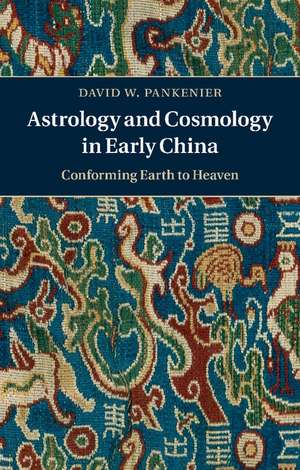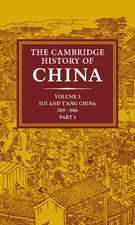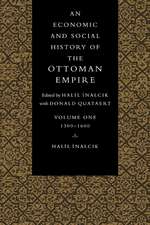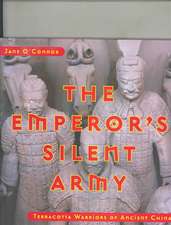Astrology and Cosmology in Early China: Conforming Earth to Heaven
Autor David W. Pankenieren Limba Engleză Paperback – 4 mar 2015
| Toate formatele și edițiile | Preț | Express |
|---|---|---|
| Paperback (1) | 353.24 lei 6-8 săpt. | |
| Cambridge University Press – 4 mar 2015 | 353.24 lei 6-8 săpt. | |
| Hardback (1) | 907.28 lei 6-8 săpt. | |
| Cambridge University Press – 9 oct 2013 | 907.28 lei 6-8 săpt. |
Preț: 353.24 lei
Nou
Puncte Express: 530
Preț estimativ în valută:
67.60€ • 69.84$ • 56.23£
67.60€ • 69.84$ • 56.23£
Carte tipărită la comandă
Livrare economică 19 martie-02 aprilie
Preluare comenzi: 021 569.72.76
Specificații
ISBN-13: 9781107539013
ISBN-10: 1107539013
Pagini: 616
Ilustrații: 138 b/w illus. 6 maps 9 tables
Dimensiuni: 152 x 230 x 33 mm
Greutate: 0.81 kg
Editura: Cambridge University Press
Colecția Cambridge University Press
Locul publicării:New York, United States
ISBN-10: 1107539013
Pagini: 616
Ilustrații: 138 b/w illus. 6 maps 9 tables
Dimensiuni: 152 x 230 x 33 mm
Greutate: 0.81 kg
Editura: Cambridge University Press
Colecția Cambridge University Press
Locul publicării:New York, United States
Cuprins
Introduction; Part I. Astronomy and Cosmology in the Time of Dragons: 1. Astronomy begins at Taosi; 2. Watching for dragons; Part II. Aligning with Heaven: 3. Looking to the supernal lord; 4. Bringing heaven down to earth; 5. Astral revelation and the origins of writing; Part III. Planetary Omens and Cosmic Ideology: 6. The cosmo-political mandate; 7. The rhetoric of the supernal; 8. Cosmology and the calendar; Part IV. Warring States and Han Astral Portentology: 9. Astral prognostication and the battle of Chengpu; 10. A new astrological paradigm; Part V. One with the Sky: 11. Cosmic capitals; 12. Temporality and the fabric of space-time; 13. The sky river and cosmography; 14. Planetary portentology east and west; Epilogue; Appendix. Astrology for an empire: the 'treatise on the celestial offices' in The Grand Scribe's Records (c.100 BCE); Glossary; Index.
Recenzii
'David Pankenier's examination of traditional cosmology and astrology in China is the authoritative work in the area. It draws on the latest evidence and most recent scholarship to make a compelling case for the central role of the sky in Chinese religion, philosophy, political thought and social organisation. This book makes a significant contribution both to our understanding of Chinese history and culture, and to the wider history of ideas.' Nicholas Campion, Sophia Centre for the Study of Cosmology in Culture, University of Wales, Trinity Saint David
'Professor Pankenier has made many important discoveries about the sky in Early China … This is a series of admirably ingenious probes into not only the darkness of the sky above, but also that of the ancient mind. Hardly any other book has disclosed nearly as many secrets about early human history as does [this] volume, which the specialists will find deeply educating, even entertaining, and everyone else will find exciting.' Li Feng, Columbia University, New York
'Astrology and Cosmology in Early China is a unique and profoundly learned contribution to early Chinese intellectual history, religion, and science - nothing like it exists in any Western language. The comprehensive sum of the author's deep research over three decades, the book offers a magisterial cultural history of what the astral order meant to the ancient Chinese, how they explored it, and how they interpreted it in political and religious terms. With his broad comparative and interdisciplinary perspectives, authoritative command of the ancient sources, and bold and imaginative interpretations, Pankenier has given us a true intellectual thrill, and one of far-reaching consequences for an entire range of fields both within and beyond the study of China.' Martin Kern, Princeton University, New Jersey
'Using an enormous wealth of archaeological discoveries, inscriptions, linguistic evidence, religious rites and historical sources, the author has succeeded in recovering ancient Chinese astronomical concepts and practices of paramount importance for our understanding of the formation of the Chinese civilization. A brilliant achievement!' Göran Malmqvist, Professor Emeritus, Stockholm University, and Member, Swedish Academy
'A tremendously exciting book that powerfully demonstrates the extraordinary importance of astronomy in early China. David Pankenier argues that significant aspects of early Chinese civilization - including highly influential notions such as the Mandate of Heaven - were based upon astronomical views. The work also helps to bring early Chinese astronomy into the larger comparative study of archaeoastronomy.' Michael Puett, Harvard University, Massachusetts
'Professor David Pankenier is a renowned sinologist who is very well known to Chinese academics. For many years his research has focused on texts and artifacts connected with ancient Chinese astronomy, yielding outstanding achievements and many profound insights … From Pankenier's book the reader can acquire a full appreciation of the special characteristics of ancient Chinese ways of thinking. He ingeniously combines in-depth analysis, discussion, and interpretation of ancient astronomy, in particular the nature and significance of astrology, to explore and integrate intellectual history and astronomy with political and military history, research from which scholars of many disciplines will derive benefit.' Li Xueqin, Director, Institute of History, Chinese Academy of Social Sciences, Beijing, and Director, Institute of Sinology, Tsinghua University
'Professor Pankenier has made many important discoveries about the sky in Early China … This is a series of admirably ingenious probes into not only the darkness of the sky above, but also that of the ancient mind. Hardly any other book has disclosed nearly as many secrets about early human history as does [this] volume, which the specialists will find deeply educating, even entertaining, and everyone else will find exciting.' Li Feng, Columbia University, New York
'Astrology and Cosmology in Early China is a unique and profoundly learned contribution to early Chinese intellectual history, religion, and science - nothing like it exists in any Western language. The comprehensive sum of the author's deep research over three decades, the book offers a magisterial cultural history of what the astral order meant to the ancient Chinese, how they explored it, and how they interpreted it in political and religious terms. With his broad comparative and interdisciplinary perspectives, authoritative command of the ancient sources, and bold and imaginative interpretations, Pankenier has given us a true intellectual thrill, and one of far-reaching consequences for an entire range of fields both within and beyond the study of China.' Martin Kern, Princeton University, New Jersey
'Using an enormous wealth of archaeological discoveries, inscriptions, linguistic evidence, religious rites and historical sources, the author has succeeded in recovering ancient Chinese astronomical concepts and practices of paramount importance for our understanding of the formation of the Chinese civilization. A brilliant achievement!' Göran Malmqvist, Professor Emeritus, Stockholm University, and Member, Swedish Academy
'A tremendously exciting book that powerfully demonstrates the extraordinary importance of astronomy in early China. David Pankenier argues that significant aspects of early Chinese civilization - including highly influential notions such as the Mandate of Heaven - were based upon astronomical views. The work also helps to bring early Chinese astronomy into the larger comparative study of archaeoastronomy.' Michael Puett, Harvard University, Massachusetts
'Professor David Pankenier is a renowned sinologist who is very well known to Chinese academics. For many years his research has focused on texts and artifacts connected with ancient Chinese astronomy, yielding outstanding achievements and many profound insights … From Pankenier's book the reader can acquire a full appreciation of the special characteristics of ancient Chinese ways of thinking. He ingeniously combines in-depth analysis, discussion, and interpretation of ancient astronomy, in particular the nature and significance of astrology, to explore and integrate intellectual history and astronomy with political and military history, research from which scholars of many disciplines will derive benefit.' Li Xueqin, Director, Institute of History, Chinese Academy of Social Sciences, Beijing, and Director, Institute of Sinology, Tsinghua University
Notă biografică
Descriere
Drawing on a vast array of scholarship, this pioneering text illustrates how profoundly astronomical phenomena shaped ancient Chinese civilization.















